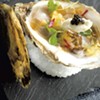Published January 16, 2013 at 12:52 p.m.
Numerically speaking, 258 is innocuous; it could be a street address, an area code, the title of an Emily Dickinson poem. If you’re talking cholesterol, though, 258 is a bad, bad number — it’s alarmingly high. So when I recently learned that 258 was my own number, I had visions of my heart abruptly stopping while I was shoveling snow or just walking down the street. With a sinking feeling, I thought of the Lillé cheese, seared pork belly, butter-slathered shrimp and other foods that probably helped to infuse my blood with waxy steroids.
Like the 12 pounds I’ve gained in the last two years, though, it was a problem much easier to identify than address. High cholesterol appears to be an occupational hazard of being a food writer who eats out regularly. If I need to review a pizzeria, I eat pizza several nights in a row. If the “signature burger” is smothered in bacon and cheddar, I eat that, too, even if my breakfast was cannoli French toast or a cider donut and a frothy latte. If I’m writing a story on cocktails, I sample them many nights in a row — sometimes subjecting myself to a low-grade headache and interrupted sleep.
Of course, the job also entails giddy days traipsing around farms or taste-testing sandwiches, and blissful nights at cafés in the middle of nowhere where the chef showers me with new dishes. “Being a food writer must be such drudgery,” said no one, ever. So when others swoon over “how fun” my job must be, my rote reply is nodding agreement. I rarely try to explain the loss of control over my diet that comes with writing about food, because it might make me appear spoiled and ungrateful.
From fellow food writers, I’ve heard stories about gout, gallstones and struggles with obesity. Frank Bruni — for several years the New York Times’ restaurant critic — wrote an entire book, Born Round, about his effort to control his weight.
The pounds glom on. The face breaks out. The digestion gets rattled. And for some, I guess, the cholesterol soars.
Interviews with chefs, bakers and bartenders have shown me the problem isn’t unique to writers. One local pastry chef told me that, though he tastes everything he bakes, he spits out those samples to keep his weight under control. Ditto for a New Orleans bartender who realized she was an alcoholic but still loves mixing cocktails; she now dips a straw into each drink, tastes it and spits it back out.
The food equivalent of “sniff, swirl, spit” doesn’t really work in restaurants. Seeking to find out how other food writers navigate their caloric minefields, I tracked down a few — but those I talked to would admit to little more than dietary speed bumps. Melissa Pasanen, a food writer for the Burlington Free Press and food editor of Vermont Life magazine, was munching on roasted almonds and dried fruit when I called her to talk about healthy eating. The snack typified her balanced approach.
Though Pasanen tests recipes almost daily and confesses to a weakness for Vermont cheese, she stays away from “processed junk,” limits portion size, and eats her fair share of fruit and veggies, she says. Having a husband and two teenage boys in the house goes a long way toward taking care of leftovers, she adds, and expresses sympathy for anyone (like me) who has to eat out constantly.
“I don’t eat for a living,” Pasanen says. “I write about food and people and how those two interact.” And, she admits, she was blessed with a good metabolism and “naturally good cholesterol.”
I try not to drip with envy. After we talk, Pasanen tweets me a picture of local cheese melted atop bread, alongside a half-eaten carrot. OK — I get the message about balance.
More conflicted is Gesine Bullock-Prado, who authors roughly one cookbook a year. With published books on pies and candy, and a forthcoming volume on cakes, she acknowledges that weight control is her Achilles’ heel.
“The minute I hand in a cookbook, I’m confronted by the gloomy fact that recipe development and testing have led to weight gain,” Bullock-Prado writes in an email. “There’s nothing much I can do about the inevitable extra pounds; it’s going to happen. But I’ve found that staying on my running schedule helps mitigate the damage.”
When she’s “lost the plot completely” — that is, lost control, as Bullock-Prado suggests happened while writing her cake book — she gains 10 to 15 pounds, sometimes close to 20. “There was a point where I wouldn’t get on a scale, so exact numbers shall remain an ugly mystery,” she writes. Bullock-Prado’s post-book recovery includes eating vegetables and lean meats and keeping up with her running; she’s currently motivated by training for a marathon that will raise money for cancer research. And, since she recently signed on as a contributing food editor at Runner’s World magazine, she’ll be charged with supplying recipes for “athlete-friendly treats.”
This year, Bullock-Prado says she’ll begin work on a cookbook that “focuses on healthier alternatives to some of my favorite recipes.” Sounds like a proactive strategy.
There’s little chance that I can cut cheese or croissants or fatty meats out of my eating (and writing) schedule to write exclusively about healthy things any time soon. Instead, I try to mitigate the damage by running, hiking, occasional yoga and — once a year — a visit with my doctor for reassurance.
While some doctors are zealots about keeping their patients on a strict diet, mine is just the opposite. Dr. Jones, as I’ll call him, is a lean, baby-faced, gentle man with a Zenlike response to almost any question. No matter what my ailment is, whenever I see him I seem to ask the same set of questions. It goes something like this:
“I eat a lot of cheese. Should I cut down?”
“No, I wouldn’t worry.”
“Also, I drink wine almost every night with dinner. Should I worry?”
“Not unless it’s a bottle a day or more,” he’ll say.
“I’d like my liver tested,” I’ll counter, trying to appear firm.
He’ll scan my record. “We did that last time, Corin, and your enzymes were perfectly normal.”
I’ll frown. He’ll smirk. I’ll leave. We’ll repeat this the next year, and the next.
Since I’m adopted, I have no way of knowing my predisposition for heart attack, stroke or any other genetic ailment. But Dr. Jones tolerates my repetitive litany because he knows that both alcoholism and obesity plague my adoptive family. I escaped the latter but worry about the former — my mother, for instance, died of cirrhosis of the liver when she was 35.
“And what did she drink?” Dr. Jones once asked me. Well, cheap bourbon (as if the expensive stuff were any healthier).
“And you drink?” he asked. Wine, usually.
Even so, when I’m swirling and sipping and taking notes on a quaff, I wonder if this methodic approach is a way of compartmentalizing and controlling my heredity so that it doesn’t control me. Alcohol draws me like a moth to a flame, though not in the same way it has others in my family — I hope.
Back when I was a young stick figure among the giants of my family, I was obsessed with weight — that is, with gaining it. I was embarrassed by my mantis-like body, and would stand in front of mirrors willing my knees to come together. There was plenty of fuel around — fried okra, fried pork chops, fried everything from my mother’s Southern clan. On the other side, my grandfather was a butcher and instilled in his kids (including my dad) an enduring love of steaks.
Both sides of the family seemed troubled when I couldn’t eat more than one serving (even now, I often cart much of my portions home). Some would take it as a slight; older women would look at my body and whisper to me conspiratorially, “You know, dear, one day it will all change.” The subtext was that I wouldn’t be thin forever; one day, I would look just like them, DD breasts and all.
While I’ll never be buxom, my chosen career could help bear out the women’s prophecy. I can live with an extra 12 pounds, but more troubling is the possible heart failure in my future.
With 258 on my mind, I called Dr. Jones with yet more fretting.
“Yes?” he asked, when we spoke over the phone.
“This cholesterol count is high — really high,” I explained. “What should I do about it? Cut out eggs? Wine? Cheese? Should I worry?”
“No, you’re fine,” he replied with typical calm. “Your overall cholesterol is high, yes, but your good cholesterol is so extraordinarily high that you don’t need to worry.”
I scanned through the results again, this time more carefully, and there it was: an HDL of 86, which actually is freakishly high. As Dr. Jones explained, ample HDL — or high-density lipoprotein, aka “good” cholesterol — actually helps prevent heart attacks.
“How did that happen?” I asked.
“Probably because of all that wine you drink,” Dr. Jones quipped. “Just keep doing what you’re doing.”
As if I had a choice. Once I began writing about food and drink, a few years ago, I couldn’t imagine doing anything else. Even if my “good HDL” is off the charts, the overall number still leaves me uneasy. I plan to use it as an excuse to do a few things: run more, cut down on cheese and drop a small fortune on a machine I’ve coveted for years, a Vitamix blender. Hello, kale smoothies; fare thee well, Sunday mimosas.
The print version of this article was headlined "Fat Chance".
More By This Author
Speaking of Food, health & Fitness
-

Q&A: Howard Fisher Delivers Meals on Wheels With a Side of Good Cheer
Dec 20, 2023 -

Video: Howard Fisher Delivers Meals on Wheels
Dec 14, 2023 -

Q&A: Alexis Dexter Rescued 57 Shelter Cats During the July Flood
Sep 13, 2023 -

Video: Two Months After the Flood, Alexis Dexter Rebuilds Kitty Korner Café in Barre and Continues to Rescue Cats
Sep 7, 2023 -

Video: Saying Goodbye to Burlington’s Penny Cluse Café
Nov 17, 2022 - More »
Comments
Comments are closed.
From 2014-2020, Seven Days allowed readers to comment on all stories posted on our website. While we've appreciated the suggestions and insights, right now Seven Days is prioritizing our core mission — producing high-quality, responsible local journalism — over moderating online debates between readers.
To criticize, correct or praise our reporting, please send us a letter to the editor or send us a tip. We’ll check it out and report the results.
Online comments may return when we have better tech tools for managing them. Thanks for reading.















































